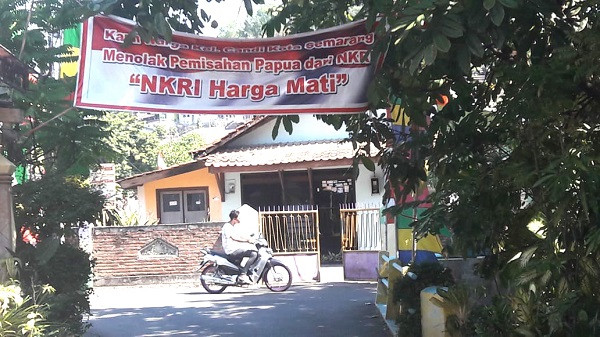
OPINION: From The Jakarta Post editorial board
JAKARTA (The Jakarta Post/Pacific Media Watch): The outbreak of violent protests in West Papua and Papua provinces over racial abuse against Papuan students in Surabaya, East Java, on Monday should give this nation an impetus to revisit its yearning for the realisation of the Unitary State of the Republic of Indonesia, or NKRI.
Nobody would expect the outrage to flare up in Papua, but the incidents clearly show that many things need to be done to remove barriers separating us from our brethren in the country’s easternmost territory.
It is just ironic that the chain of actions and reactions outside and inside Papua occurred just as Indonesia was commemorating 74 years of its birth as a nation and renewing its commitment to unity in diversity. Only last Friday, President Joko “Jokowi” Widodo underlined the founding principle as the force that would help the country win the global competition.
READ MORE: 'Racist' attack on Papuan students
The fury in Papua, which has been expressed in many ways, ranging from an arson attack on the West Papua Regional Legislative Council (DPRD) building in Manokwari and calls for a referendum to choose between exiting and remaining with Indonesia, looks to have dismantled all efforts to win Papuan people’s hearts and minds.
Jokowi, for one, has visited Papua more frequently than any other Indonesian president, built more airports and finalized the trans-Papua road, opening many outlying Papuan villages from isolation, ordered a single fuel price in the name of justice for Papua and taken over the Freeport gold mine. It turns out, however, that Jokowi’s initiatives, and those of his predecessors, are far from enough.
Jakarta, as well as many of us, has for decades perceived Papua’s integration into the republic, which followed the United Nations-sanctioned Act of Free Choice in 1969, as the incorporation of a territory called Netherlands New Guinea, along with its abundant natural resources, into Indonesia.
Papua's treasures
It was Papua’s treasures, forest, minerals, oil and gas, that prompted Jakarta to fight it out in defense of the land in the first place. Unsurprisingly, Indonesia under the New Order regime resorted to a security approach to keep Papua an integral part of the country — an approach that strangely has been maintained by post-New Order governments.
The special autonomy awarded in 2001 does not change Papua as a territory that needs extra care in terms of security. The huge amount of special autonomy funds transferred to Papua and later West Papua has yet to significantly help Papuans escape from poverty.
The two resource rich provinces remain the poorest and least developed in the country. Imagine what will happen when the transfer of special autonomy funds has to end in 2021 in accordance with the law.
Something, if not many things, has gone wrong with the way we deal with Papua. The history of Papua’s integration has missed its human element. The most recent case of racial abuse, not to mention the rampant atrocities against Papuans, only proves our defiance of them as fellow members of the Indonesian big family.
More than just money and infrastructure, respect and dignity are the reasons for Papuan people to live with the rest of Indonesia and make their dreams come true.
This is the opinion of The Jakarta Post, distributed as part of our media education role, not an opinion of Pacific Media Watch.



